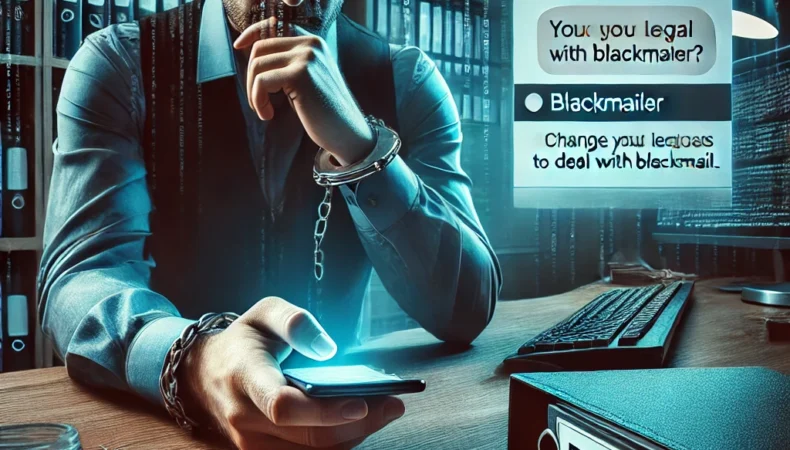Introduction
Blackmail is a serious crime that can have devastating effects on victims, leading to stress, fear, and anxiety. Whether the blackmailer is threatening to reveal personal information, compromising photos, or sensitive secrets, it’s important to know how to handle the situation safely and legally. This guide will provide you with steps to take if you find yourself a target of blackmail, helping you protect yourself and take appropriate action.
Understanding Blackmail
Blackmail occurs when someone threatens to reveal private information or take harmful action unless you meet their demands, often involving money or favors. It’s a criminal offense in most jurisdictions, and dealing with it requires a careful approach to avoid further complications.
Step 1: Stay Calm and Don’t Respond Immediately
1.1 Take a Breath
- Why It’s Important: Your first reaction may be panic, but staying calm is crucial. Acting impulsively or out of fear can lead to mistakes or actions that worsen the situation.
- Gather Your Thoughts: Before taking any action, take a moment to calm down and think clearly. It’s important to approach the situation with a clear mind.
1.2 Avoid Engaging with the Blackmailer
- Why Avoidance is Key: Responding to the blackmailer can give them more power and may escalate their demands. It’s best not to engage with them directly until you have a plan in place.
- Document the Threat: Instead of replying, document all communications from the blackmailer. Save messages, emails, or any other form of contact. This evidence is crucial for law enforcement.
Step 2: Secure Your Information
2.1 Change Passwords and Secure Accounts
- Why It’s Important: If the blackmailer has access to your online accounts, changing your passwords immediately is crucial. Use strong, unique passwords and enable two-factor authentication (2FA) where possible.
- Secure Your Devices: Ensure your computer, phone, and any other devices are secure from malware or unauthorized access. Run a full security scan using reliable antivirus software.
2.2 Remove Sensitive Content
- Review Online Presence: Search for and remove any sensitive information or content that could be used against you. This might include photos, videos, or personal details on social media platforms.
- Privacy Settings: Review and tighten your privacy settings on social media and other online accounts to limit who can see your information.
Step 3: Gather Evidence
3.1 Document Everything
- Why It’s Important: Collecting evidence is critical in building a case against the blackmailer. Save all communications, take screenshots, and note down any details about the blackmailer’s identity or demands.
- Store Safely: Keep this evidence in a secure location, both digitally and physically, to present to law enforcement or legal advisors when necessary.
3.2 Avoid Deleting Messages
- Preserve Evidence: It may be tempting to delete threatening messages, but it’s essential to keep them as evidence. These communications will be crucial in any legal action taken against the blackmailer.
Step 4: Seek Legal Assistance
4.1 Contact Law Enforcement
- Report the Crime: Blackmail is illegal, and contacting law enforcement is a vital step. Provide them with all the evidence you’ve gathered so they can investigate the case.
- Stay Informed: Keep track of any updates from the police and follow their instructions carefully.
4.2 Consult a Lawyer
- Why Legal Advice is Crucial: A lawyer can guide you on the best course of action and help you understand your rights. They can also communicate with the blackmailer on your behalf if needed.
- Consider a Cease and Desist Letter: In some cases, your lawyer may recommend sending a cease and desist letter to the blackmailer, warning them of legal consequences if they continue their actions.
Step 5: Protect Yourself Moving Forward
5.1 Be Cautious with Personal Information
- Why It’s Important: Protecting your personal information moving forward is crucial to avoid becoming a target again. Be mindful of what you share online and who you trust with sensitive information.
- Regular Security Checks: Regularly update passwords and review the security settings on your devices and online accounts.
5.2 Seek Support
- Emotional Well-being: Dealing with blackmail can be emotionally draining. Consider talking to a therapist or counselor to help manage stress and anxiety during this time.
- Support Network: Don’t hesitate to lean on trusted friends or family members for support. Sharing your experience can help you feel less isolated and more empowered.
Conclusion
Dealing with a blackmailer is a serious and stressful situation, but it’s important to handle it calmly and legally. By securing your information, gathering evidence, seeking legal assistance, and protecting yourself in the future, you can effectively get rid of blackmailers and regain control of your life. Remember, blackmail is a crime, and you have the right to protect yourself and take action against those who threaten you.
Faq
Stay calm and avoid responding immediately. Document all communications from the blackmailer, and do not engage with them directly. It’s important to gather evidence and secure your information before taking further steps.
It is generally not recommended to pay a blackmailer, as it may encourage them to continue or increase their demands. Instead, gather evidence and seek legal assistance to address the situation through proper channels.
Change passwords on all your online accounts, enable two-factor authentication (2FA), and remove any sensitive content from your devices and online profiles. Conduct a full security scan of your devices to ensure they are not compromised.
Yes, blackmail is a crime, and you should report it to law enforcement. Provide them with all the evidence you’ve collected, including messages, emails, and any other relevant information.
Document all communications from the blackmailer, including screenshots of messages, emails, and any other forms of contact. Note any details about the blackmailer’s identity or demands and store this information securely.
A lawyer can provide legal advice, help you understand your rights, and communicate with the blackmailer on your behalf. They may also recommend sending a cease and desist letter to the blackmailer and guide you through the legal process.
Do not give in to their demands. Focus on securing your information, gathering evidence, and seeking legal assistance. Law enforcement can help prevent the blackmailer from following through on their threats.
Protect your personal information by being cautious about what you share online and with whom. Regularly update passwords, enable 2FA, and maintain strong privacy settings on your online accounts.
While blackmail can occur both online and in person, it has become more common online due to the ease of accessing personal information and the anonymity the internet provides. Always be cautious with your online presence.
Yes, dealing with blackmail can be emotionally taxing. Talking to a therapist or counselor can help you manage stress and anxiety during this time. Additionally, seeking support from trusted friends or family members can provide comfort and guidance.
Last modified: August 13, 2024



